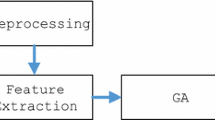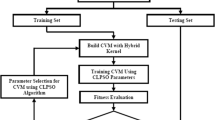Abstract
Support vector machines, especially when using radial basis kernels, have given good results in the classification of different volatile compounds. We can achieve a feature extraction method adjusting the parameters of a modified radial basis kernel, giving more importance to those features that are important for classification proposes. However, the function that has to be minimized to find the best scaling factors is not derivable and has multiple local minima. In this work we propose to adapt the ideas of the ant colony optimization method to find an optimal value of the kernel parameters.
Preview
Unable to display preview. Download preview PDF.
Similar content being viewed by others
References
Hines, E., Llobet, E., Gardner, J.: Electronic noses: a review of signal processing techniques. IEE Proc. Circuits Dev. and Systems 146, 297–310 (1999)
Distante, C., Leo, M., Siciliano, P., Persaud, K.: On the study of feature extraction methods for an electronic nose. Sensors and Actuators B: Chem. 87, 274–288 (2002)
Vapnik, N.V.: The Natureof Statistical Learning Theory. Springer, New York (2000) (1 edn., 1998)
Al-Khalifa, S., Maldonado, S., Gardner, J.: Identification of co and no2 using a thermally resistive microsensor and support vector machine. IEE Proc. Science Meas. and Tech. 150(6), 11–14 (2003)
Pardo, M., Sberveglieri, G., Gardini, S., Dalcanale, E.: Classification of electronic nose data with support vector machines. Sensors and Actuators B: Chem. 107, 730–737 (2005)
Chapelle, O., Vapnik, V., Bousquet, O., Mukherjee, S.: Choosing multiple parameters for support vector machines. Machine Learning 46(1), 131–159 (2002)
Dorigo, M., Stützle, T.: Ant Colony Optimization. MIT Press, Cambridge (2004)
Dorigo, M., Di Caro, G.: The ant colony optimization meta-heuristic. In: Corne, D., Dorigo, M., Glover, F. (eds.) New Ideas in Optimization, pp. 11–32. McGraw-Hill, London (1999)
Platt, J.: Fast training of svms using sequential minimal optimization. In: Schölkopf, B., Burges, C., Smola, A. (eds.) Advances in Kernel Methods – Support Vector Learning, pp. 185–208. MIT Press, Cambridge (1998)
Joachims, T.: Estimating the generalization performance of a SVM efficiently. In: Langley, P. (ed.) Proc. of ICML 2000, pp. 431–438. Morgan Kaufmann, San Francisco (2000)
Author information
Authors and Affiliations
Editor information
Editors and Affiliations
Rights and permissions
Copyright information
© 2006 Springer-Verlag Berlin Heidelberg
About this paper
Cite this paper
Acevedo, J., Maldonado, S., Lafuente, S., Gomez, H., Gil, P. (2006). Model Selection for Support Vector Machines Using Ant Colony Optimization in an Electronic Nose Application. In: Dorigo, M., Gambardella, L.M., Birattari, M., Martinoli, A., Poli, R., Stützle, T. (eds) Ant Colony Optimization and Swarm Intelligence. ANTS 2006. Lecture Notes in Computer Science, vol 4150. Springer, Berlin, Heidelberg. https://doi.org/10.1007/11839088_47
Download citation
DOI: https://doi.org/10.1007/11839088_47
Publisher Name: Springer, Berlin, Heidelberg
Print ISBN: 978-3-540-38482-3
Online ISBN: 978-3-540-38483-0
eBook Packages: Computer ScienceComputer Science (R0)




